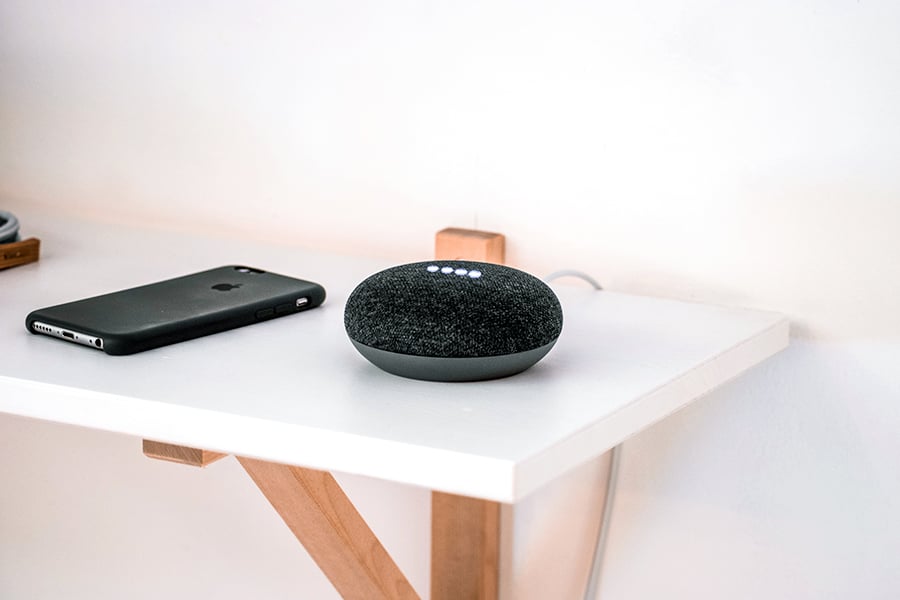During the pandemic, the popularity of smart home devices has surged, leading to more people buying and incorporating multiple smart home products in their everyday lives.
Imagine pulling up to your carpark after a long, tiring day at work. You whip out your phone and tap a button. Within seconds, the aircon in your house switches on to cool your living room down to the perfect temperature and the water heater powers up to prepare for a soothing warm shower.
Low, romantic lights flicker on, and soft jazz starts playing in the background to create a tranquil, spa-like ambience to welcome you back home.
Of course, all these things would probably take you just 5 minutes to set up when you get back, but hey, that’s 5 minutes you can spend walking to the fridge to get yourself some snacks and drinks.
This is what living in a smart home feels like – having an invisible butler catering to your every whim, so you never need to move a muscle.
What is a smart home?
A smart home, in basic terms, means replacing household appliances with devices that help you automate your daily tasks. These devices are connected to and controlled by your home WiFi network and can be operated in various ways. These include voice commands, apps on your mobile devices or remotes and switches.

However, with great power comes great responsibility. Being able to enjoy extreme technological convenience at our fingertips doesn’t come without caveats. The smarter your home is, the more susceptible it is to be hacked.
In 2020, hacked footage from security cameras were shared publicly on pornographic sites, featuring unsuspecting people in various stages of undress or compromising positions.
Can smart home devices be hacked?
In a typical modern home, we have an average of five devices connected to our network, which excludes computers, tablets and mobile phones.
These are other devices such as our Google Home, smart TV, printer, game console, and in some households, even the fridge and washing machine.

Many of these devices have little to no built-in security and can be hacked and accessed remotely. Having just a single weak link means the attacker is able to steal confidential data from anything else connected to the same network, such as your laptop or mobile phone.
What’s the worst thing that could happen?
Here’s the worst-case scenario. Someone with malicious intent hacks into one of your devices and gains access to your home security system. With this access, they can easily monitor you through the built-in cameras in your devices, such as your laptops, desktop computers and mobile devices.
If you have home security cameras or baby monitors installed around your house, they could easily access the video feed and even change the settings on it.
You could be going about your everyday activities, blissfully unaware that someone is watching and recording your every move. They might even watch you while you sleep.
Can you track these hackers?
Hackers often cloak their locations by using other hacked devices or by hiding behind a network of compromised computers, also known as a botnet. This makes it hard or even impossible for authorities to determine their actual location.
These hackers scan for and hack devices for various reasons. The milder reasons would be basic bragging rights, boredom or sheer curiosity. Other hackers do it for more malicious reasons, including blackmail, extortion, data theft and surveillance.

One common way they breach your security remotely is by phishing. This is when they pretend to be a trusted company or individual, sending official-looking emails and prompting unsuspecting victims to click on links.
What you can do
1. Use unique passwords
While it might seem tempting to use “Password” or “123456” as your common password across many seemingly insignificant devices, doing so leaves your internet security wide open for hackers to bypass without breaking a sweat. Yes, it might be troublesome to designate a unique password for each respective device, but doing so ensures your home security remains resilient to hackers.
Unsure if you’ll remember all your passwords? Use a secure password manager. These managers double up as an encrypted digital vault as well as a strong password generator to help you come up with non-repeating passwords.
2. Enable two-factor verification
On top of having unique passwords, make sure to enable two-factor authentication. Usually, this will require you to enter a specific code that is generated at random and sent to you via text, email or apps like Google Authenticator.
Intruders can no longer get immediate access if they manage to hack or phish any of your passwords. Without approval at the second factor, the main password alone is useless.
3. Protect your WiFi network
When setting up your WiFi router, the most important thing is to never retain the default settings. While it may seem easier to use the default user and password that came with your device, it is imperative you choose a completely different password altogether.
This means creating a unique password that’s not used on any of your other devices. You should also use a WPA2 encryption and enable any available firewalls.
4. Only purchase from reputable smart home technology brands
While it may be tempting to save some money by buying the cheaper off-brand product, it is crucial to keep in mind that it may come with added risks.
Reputable brands have their reputation on the line, so they vested interest in investing more into their smart home devices. They make sure their products are secure, and bugs are swiftly fixed with security patches, even after they leave the shelves.
5. Update your devices regularly
We’ve all clicked the “Remind me later” or “Ignore” option when prompted to update our devices. However, doing so may leave easy gaps in our security where hackers can use software to infiltrate an outdated, vulnerable system.
Reputable manufacturers usually release regularly firmware and security updates, so make sure all your devices stay up to date and secure.
A little prevention can go a long way toward keeping your home security safe.
Do you currently have a smart home? Let us know in the comments section below.
If you found this article helpful, 99.co recommends Property Jargon of the Day: Smart Home and Top smart home features you can find in Singapore properties.
Looking for a property? Find the home of your dreams today on Singapore’s fastest-growing property portal 99.co! If you would like to estimate the potential value of your property, check out 99.co’s Property Value Tool for free. Meanwhile, if you have an interesting property-related story to share with us, drop us a message here — and we’ll review it and get back to you.
The post Smart home devices and hackers: What can you do about it appeared first on 99.co.

